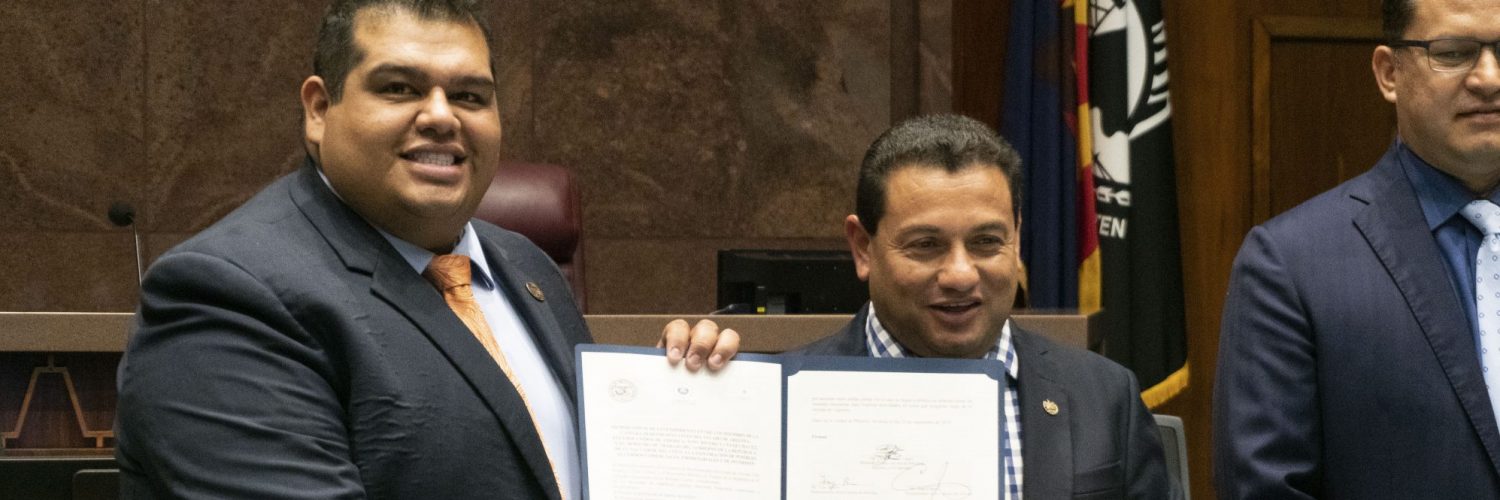This week, El Salvador Minister of Labor and Social Welfare Rolando Castro visited the Arizona State Capitol to speak with representatives and leaders in the state.
Having sworn in a new president in early June, the country hopes to alter its reputation of government corruption. One of the first steps is forging strong ties with the U.S., Castro said.
For years, El Salvador has been scrutinized for its alarmingly high homicide rate and gang presence. According to Human Rights Watch, the Central American country has roughly 60,000 gang members, and as a consequence, the country had the world’s highest intentional homicide rate in 2016.
Because of these dangers, many citizens are fleeing to the U.S. for safety and opportunity. Through eight months of this year, 86,000 Salvadoran migrants have been arrested at the U.S. border, according to U.S. Customs and Border Protection.
“We have an agreement with the government of the United States to transfer at least a thousand new workers legally from El Salvador to the U.S. The reason people were moving to the United States was because of the lack of opportunity and the criminal activity that was happening in our country,” Minister Castro said. “We want to guarantee our population that they have the opportunity that they need, and it has to be in a legal manner. Since we took office in June, to this day, there has been a 70 percent decrease in immigrants from El Salvador. This is because our population is very hopeful about the new government.”
Castro explained that, since signing a peace treaty in 1992 that ended a 12-year civil war, the country had not had a single day without murder until the installation of President Nayib Bukele in June. Within 12 days of government, he said, the country had multiple days without a single homicide.
To stifle illegal immigration, President Trump signed an agreement with El Salvador just last Friday, which requires migrants who pass through El Salvador to seek asylum in the Central American country rather than the United States.
But this poses a larger question about the futures of roughly 194,000 Salvadorans currently residing in the U.S. with temporary protected immigration status. Aside from the thousand H-2A visas that the government plans on giving to Salvadorans living in the U.S., next steps for temporarily protected immigrants are unclear.
“The thousand immigrants is just one step. We also look forward to having more steps than just those thousand. We know that the United States has [a] lack of labor in different sources such as agriculture and construction, so we want to make sure that these thousand visas given temporarily are not just the first one that are going to happen,” Castro said. “We also want to work with different visas in construction and we know that we have more than a thousand people to offer to this country. We have a big population after those 30 years of corruption that are very, very poor and that are willing to work as much as possible in this country legally.”
Under the agreement with the U.S. Embassy, Castro explained, Salvadorans seeking to migrate to the U.S. must pass a background check and must have a family in El Salvador in order to return after working six to eight months in the U.S. After this period, Castro plans to have temporary migrants return to El Salvador to help rebuild its economy.
Castro also encouraged businesses to invest in El Salvador, explaining that the country is “the path between North America and South America.” Because of its hard-working labor force and navigable landscape, El Salvador presents strong investment opportunities for U.S. companies.
“We know that there’s 11,000 companies — that are certificated by the Department of Labor — that are willing to work with us,” he said. “Knowing that there’s a lot of labor that’s needed in this country and we have a lot of people to offer, within these past few days, we’ve been talking to a lot of companies in order to reach a program that is helpful — not only in agriculture, but also in construction.”
Photo courtesy of Bailey Netsch
















Add comment